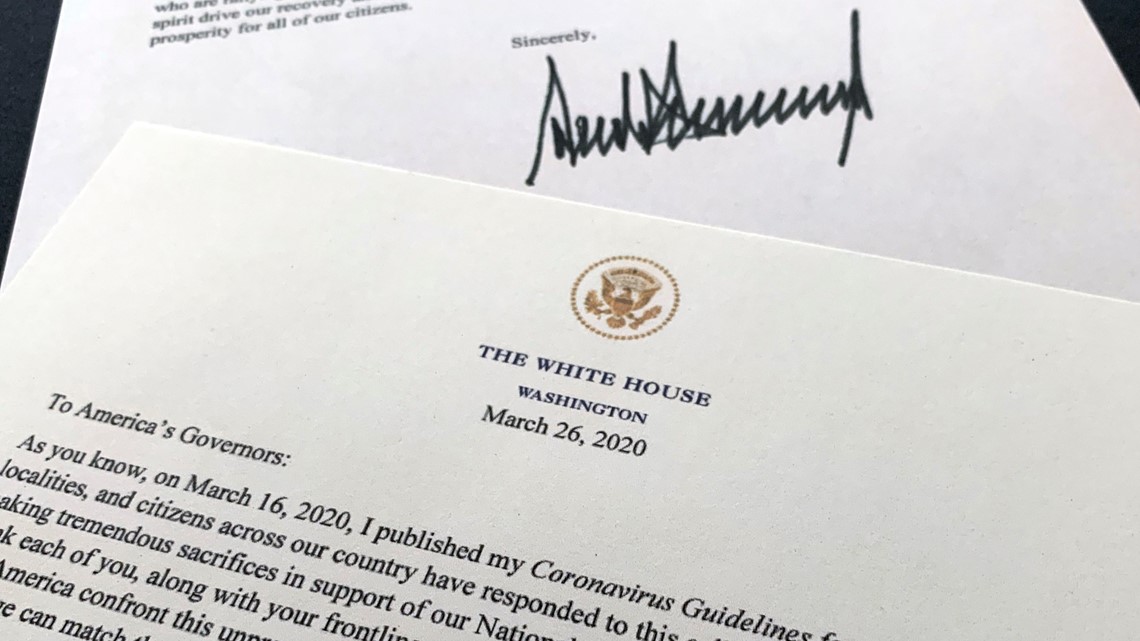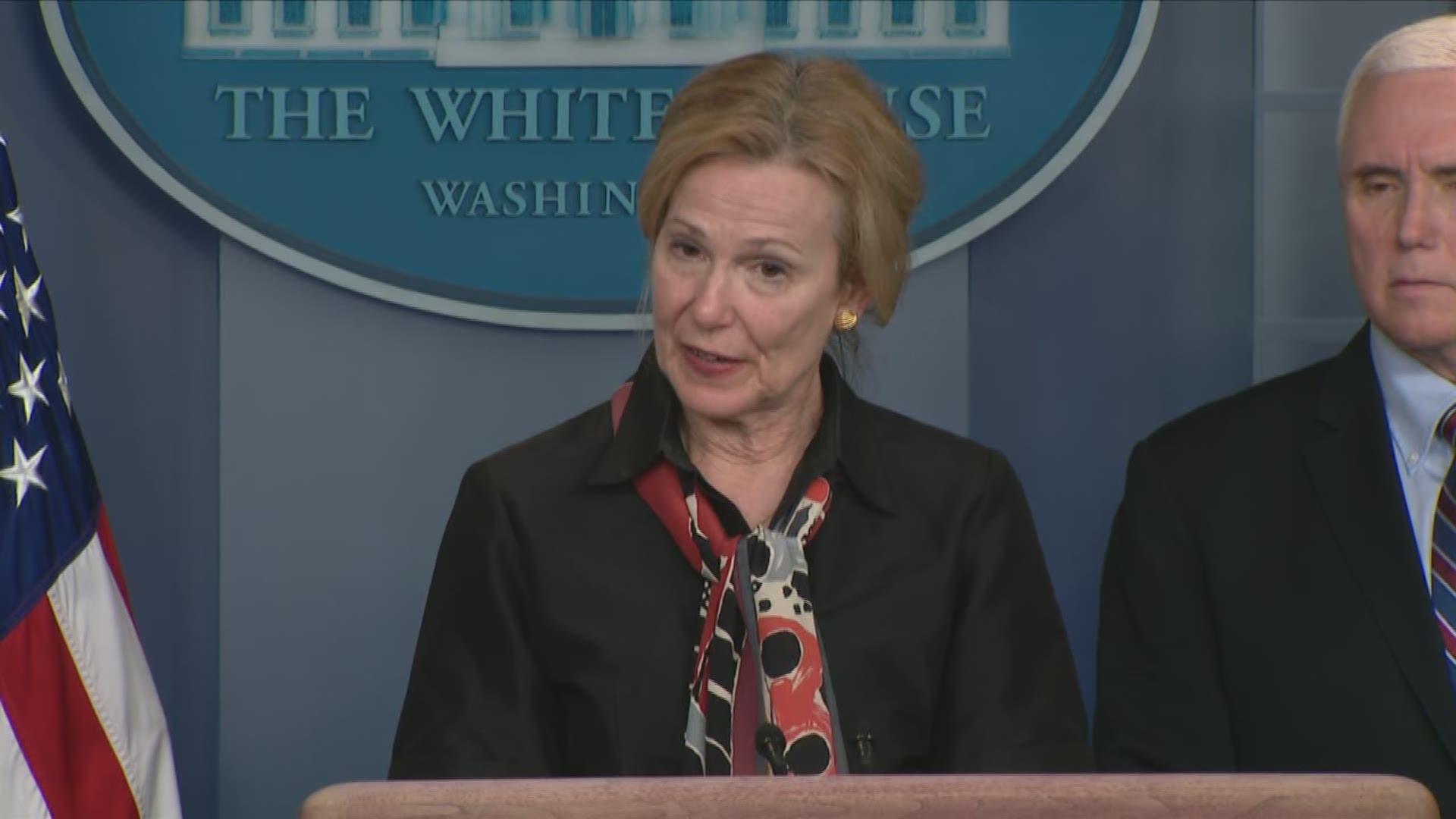WASHINGTON — President Donald Trump said Thursday that federal officials are developing guidelines to rate counties by risk of virus spread, as he aims to begin to ease nationwide guidelines meant to stem the coronavirus outbreak.
In a letter to the nation's governors, Trump said the new guidelines are meant to enable state and local leaders to make “decisions about maintaining, increasing, or relaxing social distancing and other measures they have put in place.” States and municipalities would still retain authority to set whatever restrictions deem necessary.
“I think we can start by opening up certain parts of the country: you know, the farm belt, certain parts of the Midwest, other places,” Trump said Thursday in an interview with Fox News Channel's Sean Hannity. “I think we can open up sections, quadrants, and then just keep them going until the whole country is opened up."
The president has been trying for days to determine how to contain the economic fallout of the guidelines issued by his administration as well as local leaders to slow the tide of infections.
“Every day that we stay out it gets harder to bring it back very quickly," Trump said during a Thursday press conference.
RELATED: VERIFY: What COVID-19 stands for
Last week Trump unveiled a 15-day program advising against large gatherings and calling for many Americans to remain at home. The guidelines, issued by the Centers for Disease Control and Prevention, are voluntary, but many state and local leaders have issued mandatory restrictions in line with, or even tighter than, those issued by the CDC.
The White House was still developing the new guidelines and gathering the data to back them up, Dr. Deborah Birx, the White House coordinator for coronavirus response, told reporters Thursday.
“What we are trying to do is utilize a very laser-focused approach rather than an generic horizontal approach," she said.
Birx acknowledged concerns that people could simply move between areas with different infection risks — and potentially different restrictions on movement and gathering amid the outbreak.
“Part of this will be the need to have highly responsible behavior between counties,” she said, saying the administration would provide additional guidance to states next week, once the new plan is finalized.
Two administration officials said it would not involve any restrictions on travel between hotspots and those with lower rates of infection.
Trump announced Thursday that he would visit Norfolk, Virginia, on Saturday to see off the USNS Comfort, the 1,000-bed hospital ship heading to assist New York in responding to the virus.
Still, he dismissed desperate calls from governors, including New York's Andrew Cuomo, who have pleaded for additional ventilators to help treat patients with COVID-19.
“I don’t believe you need 40,000 or 30,000 ventilators," Trump said, referencing New York's request of the federal government.
On a conference call with governors Thursday, Trump stressed the need to reopen businesses and to recognize regional differences in the virus’ impact.
“We all have to get smart,” Trump said on the call, audio of which was obtained by The Associated Press. “We have to open up our country, I'm sorry.”
Mississippi Republican Gov. Tate Reeves, who has not ordered business closures or limits on social behavior, thanked Trump for recognizing that the virus has affected states differently and “one size does not fit all.”
“I appreciate you realizing that,” Reeves said.
The announcement of the forthcoming new guidelines comes days after Trump said he hoped to “reopen” the country by Easter.
“I would love to have the country opened up and just raring to go by Easter," he said Tuesday during a Fox News virtual town hall. Easter is just over two weeks away — Apr. 12.
Health experts have made clear that unless Americans continue to dramatically limit social interaction — staying home from work and isolating themselves — the number of infections will overwhelm the health care system, as it has in parts of Italy, leading to many more deaths.
And scientists, including Dr. Anthony Fauci, the nation's top infectious disease expert, have cautioned against artificial timetables.
“And you've got to understand that you don't make the timeline, the virus makes the timeline,” Fauci told CNN Wednesday. “So you've got to respond, in what you see happen.”
White House counselor Kellyanne Conway said Trump developed the Easter date as a goal to give people “hope.”
“I think, Easter, the president was giving people a lot of hope and basically telling us it won’t last forever, and we’ll see what happens over time," she told reporters Thursday.
While the worst outbreaks are concentrated in certain parts of the country, most significantly in New York, experts warn that the highly infectious disease is certain to spread.
Trump said the rollout of additional testing will enable more nuanced recommendations that would allow some lesser-impacted parts of the country to regain a sense of normalcy sooner.
“Our expanded testing capabilities will quickly enable us to publish criteria, developed in close coordination with the Nation's public health officials and scientists, to help classify counties with respect to continued risks posed by the virus," Trump said.
Trump, appearing to allude to the forthcoming guidelines, promised that there would be new favorable “statistics” and “facts” coming from the federal government in the next two days.
"Some good statistics are coming out which will make your lives easier,” Trump said.
—
Suderman reported from Richmond, Va.



